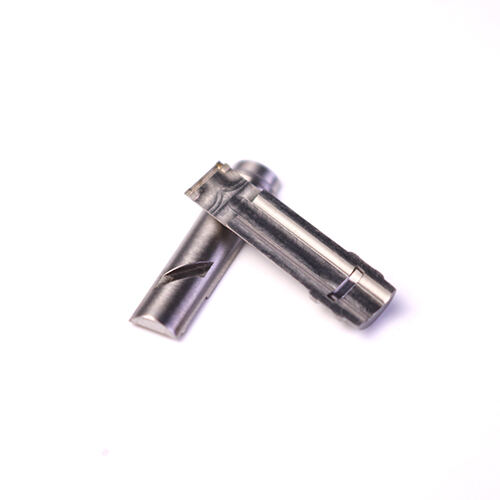ابتكار في مجال الفضاء: تقنية معالجة السبائك التيتانيومية تتقدم مرة أخرى
مع التطور المستمر لصناعة الطيران والفضاء، أصبحت الحاجة إلى مواد ذات أداء عالٍ، خفيفة الوزن، مقاومة للحرارة العالية والصدأ أكثر إلحاحًا. باعتبارها المادة الرئيسية لتلبية هذه الحاجة، تحتل سبائك التيتانيوم مكانة محورية في مجال الطيران والفضاء بسبب خصائصها الميكانيكية الممتازة ومقاومتها للتآكل. مع التقدم المستمر في تقنية معالجة سبائك التيتانيوم، قدمنا ابتكارات تقنية في هذا المجال، مما فتح آفاقًا جديدة لتصنيع تصميم قطع غيار الطيران والفضاء.

أهمية سبائك التيتانيوم في الطيران والفضاء
أصبحت سبائك التيتانيوم المادة المفضلة للمكونات الرئيسية في مجال الطيران الفضائي بسبب قوتها العالية، وكثافتها المنخفضة، ومقاومتها للحرارة العالية والصدأ وغيرها من الخصائص الممتازة. مقارنةً بالمواد المعدنية التقليدية، تمتلك سبائك التيتانيوم قوة نوعية أعلى (قوة الكتلة الوحدية)، مما يمكن أن يقلل بشكل كبير من وزن الطائرات، ويعزز كفاءة الوقود، ويضمن استقرار الطائرات وأمانها في البيئات ذات درجات الحرارة المرتفعة.
تشمل التطبيقات الشائعة لسبائك التيتانيوم في الطيران الفضائي ما يلي:
· محركات الطائرات: مثل شفرات التوربينات، وشفرات الضاغط، وغرف الاحتراق وغيرها من المكونات التي تعمل في بيئات ذات ضغط وحرارة مرتفعين
· هيكل الطائرة: مثل أطر الأجنحة، والهياكل الهابطة، ودعامات الأبواب وما إلى ذلك.
· المركبات الفضائية والأقمار الصناعية: مثل أنظمة الدفع والدعامات الهيكلية وما إلى ذلك.
استخدام مواد سبائك التيتانيوم لا يوفر قوة هيكلية ومتانة ممتازة فقط، ولكن يحسن أيضًا بشكل كبير الأداء والسلامة العامة للطائرات.
تحديات تقنية تشغيل سبائك التيتانيوم
تتميز سبائك التيتانيوم بصلابتها ومتانتها العالية، مما يجعلها تواجه سلسلة من التحديات أثناء التشغيل:
· ارتداء سريع للأدوات: تسبب الصلابة والقوة العالية لسبائك التيتانيوم ارتداءً سريعًا للأداة القاطعة، مما يزيد من صعوبة وتكلفة التشغيل.
· تشوه حراري كبير: سبائك التيتانيوم لها قدرة سيئة على إجراء الحرارة، ومن السهل جدًا أن تولد كمية كبيرة من الحرارة أثناء التشغيل، مما يؤدي إلى تشوه peace العمل أو ارتفاع درجة حرارة الأداة.
· قوة قطع كبيرة: المواد المصنوعة من سبائك التيتانيوم تتطلب قوى قطع كبيرة، وهي عرضة للاهتزاز والضوضاء، مما يؤثر على دقة التشغيل وجودة السطح.
· مشاكل التآكل: على الرغم من أن السبيكة التيتانيوم تتمتع بمقاومة ممتازة للتآكل، إلا أن استخدام غير صحيح للمواد الكيميائية أثناء القطع أو تشغيل غير صحيح قد يؤدي إلى تلف السطح.
لذلك، من الضروري تطوير تقنيات متقدمة مناسبة لتشغيل سبائك التيتانيوم.
تطوير وإبداع في تقنية تشغيل سبائك التيتانيوم
في السنوات الأخيرة، ومع التقدم المستمر في تقنية التحكم العددي (CNC) والأدوات عالية الأداء، تم تحسين تقنية تشغيل سبائك التيتانيوم بشكل كبير. لقد ساعدت هذه الابتكارات التكنولوجية على التغلب الفعال على التحديات التي واجهتها طرق التشغيل التقليدية وأتاحت المزايا التالية:
1. السيطرة الأكثر دقة على القطع
يمكن للأجهزة CNC الحديثة تحقيق سيطرة أكثر دقة على عملية القطع، وتحسين معلمات القطع ومسارات الأدوات من خلال البرمجة الدقيقة، وتقليل الأخطاء في التشغيل، وتحسين دقة وجودة سطح أجزاء سبائك التيتانيوم.
2.تكنولوجياlogy لإدارة الحرارة الفعالة
في عملية تشغيل سبائك التيتانيوم، يعتبر استخدام المبرد أمرًا حاسمًا. من خلال تبني مبرد فعال ونظام تبريد رش فعال، يمكن تقليل درجة الحرارة أثناء التشغيل بشكل فعال، وتقليل ارتداء الأدوات، وتحسين كفاءة التشغيل.
3.تطبيق الأدوات عالية الأداء
مع التنمية المستمرة لمواد الأدوات، يمكن لاستخدام أدوات ذات أداء عالي جديدة مثل الأدوات المعدنية المطلية وأداة النيتريد السداسي للبورون (CBN) أن تمدد بشكل كبير عمر الأدوات وتقلل بفعالية من الاهتزاز والضوضاء أثناء التشغيل.
4.تكنولوجيا التصنيع الإضافي (الطباعة ثلاثية الأبعاد)
يظهر التصنيع الإضافي إمكانات كبيرة أيضًا في معالجة سبائك التيتانيوم، خاصة في تصنيع قطع الطيران ذات الأشكال المعقدة. يمكن للطباعة ثلاثية الأبعاد تقليل هدر المواد، وتقليل التكاليف، وتحقيق تصاميم لا يمكن تحقيقها باستخدام طرق المعالجة التقليدية.
5.التصنيع الذكي
مع دمج الذكاء الاصطناعي وتكنولوجيا البيانات الضخمة، يمكن أن تراقب أنظمة التصنيع الذكية عملية المعالجة في الوقت الحقيقي، وتعدل المعايير تلقائيًا، وتضمن دقة المعالجة وتناسق الأجزاء.
آفاق تطبيق تكنولوجيا معالجة سبائك التيتانيوم
وقد جلبت الابتكار في تكنولوجيا معالجة سبائك التيتانيوم آفاقا واسعة لصناعة الطيران والفضاء، وخاصة في الجوانب التالية:
1. تصنيع طائرات الجيل الجديد
وبما أن الطائرات الجديدة لديها متطلبات أعلى وأكثر كفاءة في استهلاك الوقود وخفيفة الوزن، ستلعب مواد سبيكة التيتانيوم دورا أكبر في الجيل الجديد من الطائرات ومحركات الطيران. يمكن لتكنولوجيا معالجة سبائك التيتانيوم عالية الدقة تلبية هذه الاحتياجات بشكل أفضل وتحسين الأداء العام للطائرات.
- 2. تصنيع مركبات فضائية وأقمار صناعية مخصصة
في تصنيع المركبات الفضائية والاقمار الصناعية، يتم استخدام أجزاء من سبائك التيتانيوم بشكل واسع بسبب أدائها الممتاز. وبفضل تقدم تقنية معالجة سبائك التيتانيوم، يمكن للمصنعين تصنيع أجزاء مخصصة بدقة أكبر لتلبية الاحتياجات الخاصة التي تتطلبها مجالات دقيقة مثل استكشاف الفضاء والاتصالات عبر الأقمار الصناعية.
3. إنتاج كميات كبيرة من الأجزاء
مع نضوج تقنية معالجة سبائك التيتانيوم، ستبدأ أجزاء سبائك التيتانيوم في مجال الطيران الفضائي بالوصول إلى إنتاج كتلة فعال. هذا سيقلل من تكلفة إنتاج الأجزاء مع ضمان بقاء معايير جودتها العالية دون تغيير.
4. تصنيع أجزاء ذات دقة عالية
من خلال تقنية الحفر CNC الدقيقة، يمكن أن تصل الدقة البعدية وجودة السطح لأجزاء سبائك التيتانيوم إلى معايير مرتفعة للغاية، مما يضمن دقة وموثوقية أنظمة الطيران الفضائي.
خاتمة
توفير الترقية المستمرة والابتكار في تقنية معالجة سبائك التيتانيوم حلول تصنيع أكثر دقة وموثوقية لصناعة الطيران الفضائي. مع زيادة المتطلبات المتعلقة بالوزن الخفيف، القوة والمقاومة للحرارة العالية للطائرات، ستلعب مواد سبائك التيتانيوم دورًا متزايد الأهمية في تطبيقات الطيران الفضائي.
كمصنع رائد لأجزاء سبائك التيتانيوم، نحن ملتزمون بتحسين مستمر للتكنولوجيا المعالجة وتقديم أجزاء فضائية من سبائك التيتانيوم بدقة وجودة عالية لتلبية احتياجات مصنعي الطيران الفضائي العالمي. من خلال العمليات التصنيعية الابتكارية والمعدات المتقدمة، سنعمل معًا على تعزيز التقدم العلمي والتكنولوجي في صناعة الطيران الفضائي والسعي نحو مستقبل أفضل.


